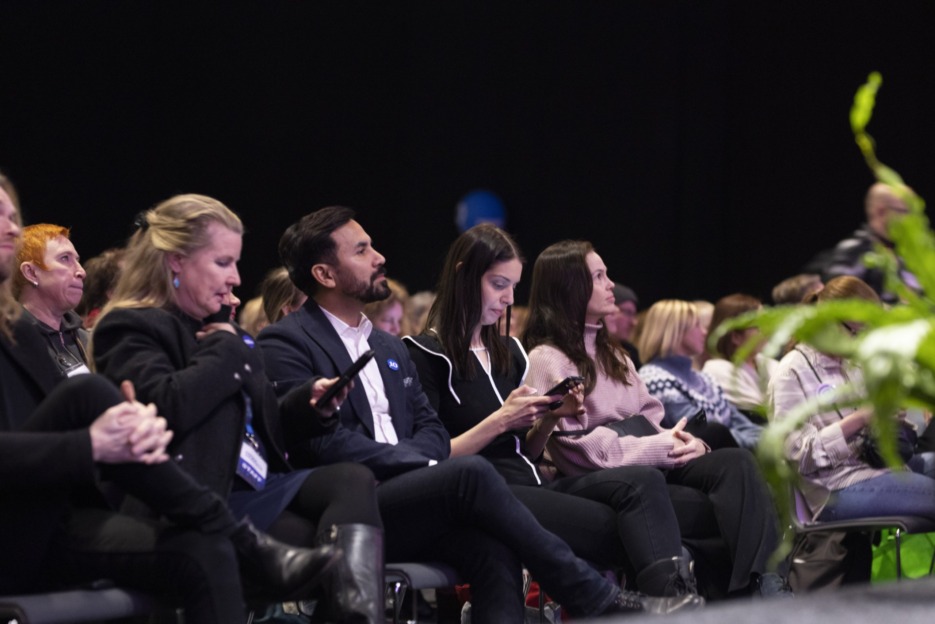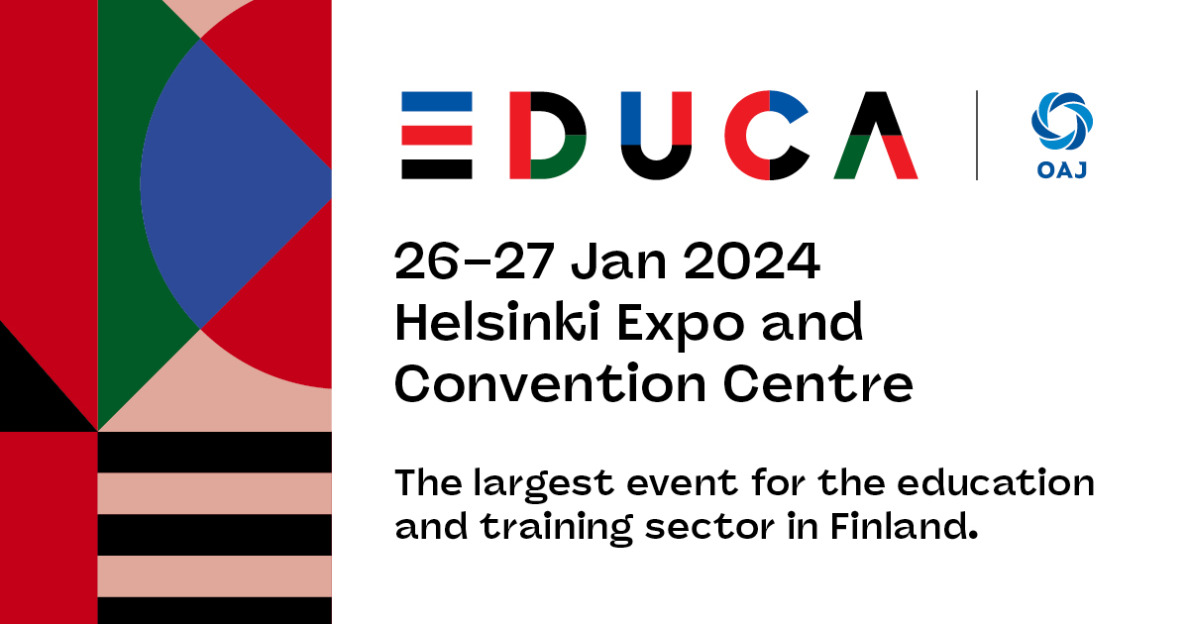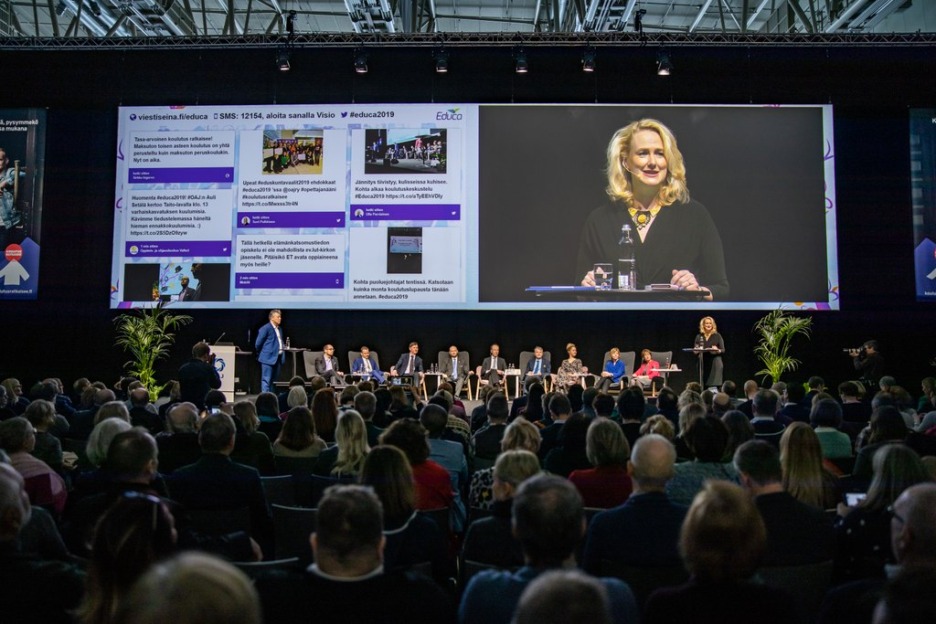The Educa 2025 international programme highlights globally discussed topics in the education and training sector

Educa 2025 offers an international programme with a focus on enhancing the appeal of the teaching profession, integrating technology and AI into education, exploring the future of education, and the importance of literacy in the digital age. It will feature keynote speeches by Professor of Educational Sciences at University of Helsinki Minna Huotilainen, and Finnish Professor of Practice and Doctor of Philosophy Pekka Sauri. The largest event for the education and training sector in the Nordic countries will be held at the Helsinki Expo and Convention Centre on 24–25 January.
Educa 2025 will offer an international programme including themes such as Enhancing the Appeal of the Teaching Profession, Technology and AI in Education, The Future of Education, and The Importance of Literacy in the Digital Age.
As part of the international programme, there will be panel discussions on the OECD's High Performing Systems for Tomorrow project and its outcomes, as well as the On Wheels Mobile Education early childhood project in Ukraine, developed in collaboration with over 30 Finnish companies and organisations. The keynote speakers for the international programme are Professor of Educational Sciences at University of Helsinki Minna Huotilainen and Finnish Professor of Practice, City Councillor, Author, and Doctor of Philosophy Pekka Sauri.
Minna Huotilainen will begin her keynote speech Brain, stress and learning on Friday, 24 January, starting at 11:30 am. Huotilainen will discuss how modern neuroscience demonstrates direct connections between learners' physiological states and learning achievements. Stress can adversely affect learning due to its impact on perception, attention, and memory.
Pekka Sauri will speak on Saturday, 25 January, at 11:40 am in his keynote speech Life Goals, Happiness, and Education in an Unpredictable World. Sauri will discuss how the happiness of today's youth is overshadowed by future uncertainties related to various global and domestic issues, as well as the dependence many have on smartphone applications. What is the way forward, and what can teachers do?
All speeches and discussions on Educa's international stage will be delivered in English and can be followed worldwide via live stream.
The international programme is implemented in co-operation with the Trade Union of Education in Finland (OAJ), the Finnish Ministry of Education and Culture, Finnish National Agency for Education EDUFI and Helsinki Expo and Convention Centre.
Highlights from Educa’s international programme:
- Friday, 24 January
- 11.30 am – 11.55 am Keynote: Brain, stress and learning – Speaker: Minna Huotilainen Modern neuroscience shows direct connections between the physiological states of the learners and the learning achievements. Specifically, stress can have detrimental effects on learning due to its effects on perception, attention, and memory. Minna Huotilainen is Professor of Educational Sciences at University of Helsinki and her work in neuroscience of education aims to make neuroscientific findings accessible to teachers worldwide.
- 1.05 pm – 1.35 pm High-level discussion: What can Finland learn from the world? Finland is a benchmark for education around the world. At the same time, it shares many global concerns regarding education. Copying isn't the key to success, but active dialogue is vital in developing systems – what can Finland learn from others? In discussion: Anders Adlercreutz, Minister of Education of Finland and Katarina Murto, Chair of the Trade Union of Education (OAJ), Finland. Intervention by Dr. Auli Toom, President of the Teacher Education Forum & vice-dean in charge of research in the Faculty of Educational Sciences, University of Helsinki.
- 2.30 pm – 3.15 pm Panel discussion: Digital citizenship in the age of AI The panel discussion will explore how digitalization, the massive increase in the volume of data and emerging technologies, such as AI are transforming societies, including the educational landscape globally. From personalized learning experiences to AI-driven administrative efficiencies, the panelists will explore the opportunities and challenges these innovations bring. Panelists: Mr. Sobhi Tawil, Director of the Future of Learning and Innovation Division, UNESCO (TBC); Mr. Frank van Cappelle, Head of the Global Learning Innovation Hub in Finland, UNICEF; Mr. Atte Jääskeläinen, President of Finnish Innovation Fund Sitra, and Ms. Jonna Korhonen, Director of Division for Higher Education Policy, Ministry of Education and Culture. Moderated by Ms. Kati Anttalainen, Senior Ministerial Adviser, Ministry of Education and Culture, Secretariat for International Relations.
- 3.20 pm – 4 pm Future skills for professionals in the digital age Digital skills have been recognised as a key skill needed in the future working life. What are these skills, and how can we ensure that future professionals can build them during their vocational studies, and continue to update their skills while they are already in working life? We hear about the European framework for digital skills and look at how Finland and Estonia have introduced digital skills as part of vocational degrees. In discussion: Külli All, Head of Skills Area at the Department of Vocational Education and Skills Policy, Ministry of Education and Research, Estonia and Sanna Laiho, Counsellor for Education, Finnish National Agency for Education. Moderated by Marjo Somari, International Communications Specialist, EDUFI.
- 4.05 pm – 4.50 pm Panel discussion: Education for Human Flourishing The high-level panel discusses the final outcomes of High Performing Systems for Tomorrow (HPST) work. The project was established by OECD for jurisdictions that achieve outstanding results in PISA and share a commitment to exploring the next frontiers in education. The panel presents the work done and aims to strengthen and deepen the foundational arguments behind human flourishing. Why and how should education purposes change in the future? What exactly do we mean by Education for Human Flourishing? And what is its relationship to the evolution of artificial intelligence? Panelists: Andreas Schleicher, Director for Education and Skills, OECD; Anita Lehikoinen, Permanent Secretary, Ministry of Education and Culture of Finland; Chern Wei, Deputy Director General, Ministry of Education, Singapore; Susan Acland-Hood, Permanent Secretary at the Department for Education, United Kingdom and Michael Stevenson, Project Lead, OECD. Moderated by Anthony Mackay, Board Chair, National Center on Education and the Economy (NCEE).
- 4.55 pm – 5.25 pm Early Childhood Education and Care on Wheels in Ukraine In Ukraine, more than 400 educational institutions have been completely destroyed, and the number continues to rise as the war goes on. Born in co-operation of more than 30 Finnish companies and entities, the On Wheels Mobile Education Center was born. The mobile kindergarten is now equipped with training, therapy, and daycare facilities, as well as extensive daycare supplies and remote communication equipment. The speakers present how psychosocial support, early childhood education and care, therapy, and professional development is now made available around Ukraine, and lessons learned under the highly stressful circumstances for children. In discussion: Bondarenko Dmytro, Deputy Head of the Association of Innovative and Digital Education; Stanislav Kutsenko, Advisor to Director of Ukrainian Institute of Education Development, and
Sanna Lukander, Founder, CCO, Fun Academy and The Campus Company.
- Saturday, 25 January
- 11.00 am – 11.30 am Introduction to the Finnish Education System The education system in Finland is often hailed as one of the best in the world. It is best known for its innovative and learner centred approaches. This presentation will explore some of the key components that make Finland’s education system a good benchmark for others. Topics will include its emphasis on equity, student well-being, and teacher autonomy. We will also delve into the challenges the system faces, including maintaining high outcomes amidst changing demographics and constantly evolving educational needs. Speaker: Jouni Kangasniemi, Secretariat for International Relations, Ministry of Education and Culture.
- 11.40 am – 12.05 pm Keynote: Life goals, happiness and education in an unpredictable world – Speaker: Pekka Sauri The happiness of young people today is overshadowed by the uncertainty of the future associated with various global and domestic problems and, for many, dependence on smartphone applications. What is the way forward, and what can educators do? Pekka Sauri is a Finnish Professor of Practice, City Councilor, Writer and Doctor of Philosophy.
Educa’s international programme can be followed via live stream by registering here.
The full programme for Educa can be found here.
More information and interview requests:
Pia Sievinen, communications specialist, Helsingin Messukeskus, tel. +358 40 559 9155, pia.sievinen@messukeskus.com
Educa, the leading event for professionals in the teaching and education sector in the Nordic countries, will be held at Helsinki Expo and Convention Centre (Messukeskus) from 24 to 25 January 2025. Educa is co-organised by Messukeskus and the Trade Union of Education in Finland (OAJ).




